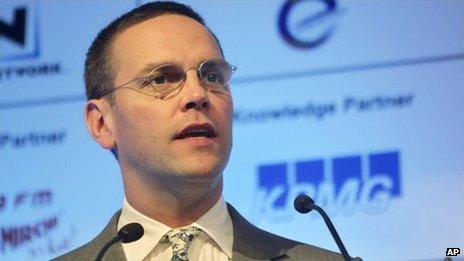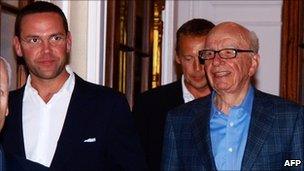Profile: James Murdoch
- Published

James Murdoch has long been widely considered to be the front runner in the race to one day take over his 80-year-old father Rupert's media empire.
But the phone-hacking row has raised questions over his suitability, despite his repeated denials of any knowledge of the illegal practice at the News of the World (NoW).
His decision to close the 168-year-old NoW - the first British national newspaper his father bought - amid the scandal, was a sign that James, wielded substantial power.
"In a crisis, he was immensely impressive," one of his colleagues said of the decision which, insiders say, was very much his.
In March 2011, he took up the newly created post of deputy chief operating officer of News Corporation, effectively making him the third most senior individual in a media empire that includes publishing, TV and film operations across the world.
The promotion came four years after he took control of News Corp's operations in the UK, Europe and Asia.
But in February of this year that power appeared diminished after he stepped down as chairman of News International, a subsidiary of News Corp and former publisher of the NoW.
Later News Corp had to drop its planned bid to take full ownership of UK satellite broadcaster BSkyB amid the phone-hacking scandal.
James had looked likely to play a central role in the company's recovery after what some commentators said was an unprecedented setback for his media mogul father.
But in April, James, 39, stepped down as chairman of UK satellite broadcaster BSkyB, saying he did not want the company to be undermined by "matters outside this company".
He will remain on the board.
News Corp's decision to drop its BSkyB bid came following the slew of allegations that claimed NoW staff hacked into the mobile phones of crime victims, celebrities and politicians.
News International has denied its former chairman had any prior knowledge of e-mails uncovered by the company in 2007, which appear to show wrongdoing.
In an interview given following the announcement of the paper's closure, he said the allegations were "shocking and hugely regrettable".
James has said he was not aware of the full extent of wrongdoing at the NoW until recently.
Throughout the controversy, James has stood shoulder to shoulder with his father.
Born in 1972, James is the youngest of Rupert Murdoch's three adult children from his marriage to Anna Torv, the others being sister Elisabeth and brother Lachlan.
Hip-hop label
He has risen higher in the company than his older siblings, who went to work for their father and later left.
But it didn't always seem likely that he would follow in his father's footsteps.
Schooled in New York, James studied film and history at Harvard University, but dropped out in the mid-1990s without completing his degree.
Gaining a reputation as the family rebel, he set up an independent hip-hop label, Rawkus Records, which launched the career of rapper-actor Mos Def and gave an airing to the then little-known Eminem.

After initially being seen as a rebel, James is now an essential part of the Murdoch family brand
Rawkus was eventually bought by News Corporation.
In 1996, he was appointed chairman of another News Corporation music label, Australia-based Festival Records, also going on to take charge of the company's fledgling internet operations.
Four years later, James was appointed chairman and chief executive of News Corporation's Asian satellite service, Star Television.
He remained there for three years before taking up the top job at BSkyB in 2003, where at the age of 30, he became the youngest ever boss of a FTSE-100 listed company.
The move prompted accusations of nepotism in some quarters amid concerns that he was too inexperienced for the top position at Sky.
However, he was widely accepted to have done a good job during his tenure at the broadcaster.
Media lecture attack
He successfully expanded BSkyB to incorporate broadband internet and telephone services, while continuing to grow its TV subscriber base.
Even then, many felt James was being moulded into the role of heir to his father's media empire.
"This is grooming James for a larger role longer term at News Corp," said Pali Research analyst Richard Greenfield, who argued that he "proved himself beyond a doubt" during his tenure at BSkyB.
By the time he took control of News Corporation's operations in the UK, Europe and Asia, he had grown in stature.
Recent years have seen him show some of the combative qualities that established his father as one of the most powerful media moguls in the world.
In 2009, James delivered the keynote MacTaggart lecture at the Edinburgh Television Festival, during which he took aim at the UK establishment.
In his speech, 20 years after his father delivered the same keynote address, James said a "dominant" BBC threatened independent journalism in the UK.
Family affair
He also blamed the government for regulating the media "with relish".
Now occupying the role of heir apparent, James had played a pivotal role in connecting the next generation of the Murdoch family to his father's company - but that role now appears to be unclear.
Reports suggest his relationships with his elder siblings can, at times, be fractious.
Elisabeth and Lachlan are said to be closer to each other than to James.
The other two appear to have done more to distance themselves from their billionaire father's media operations.
Lachlan caused widespread surprise when he stepped down from an executive position in News Corporation in 2005.
And Elisabeth set up her own media company, which was bought by her father earlier this year.
Whereas his siblings have worked for their father and subsequently left, he has created his own space within News Corporation.
Only time will tell if that space might, one day, be the nerve centre which controls the vast empire his father built.